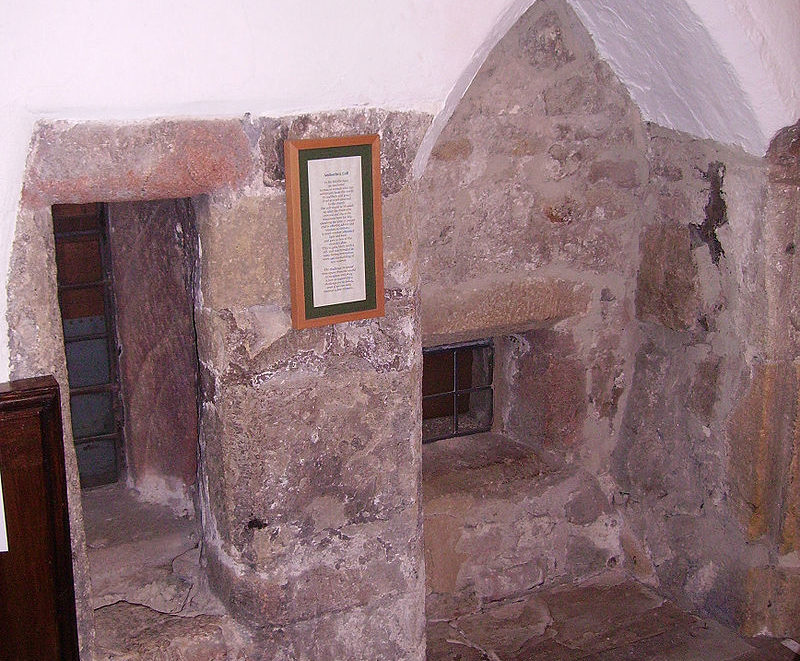
How to make fruitful use of house arrest…
A homily for Wednesday of the 5th week of Lent from our brother Fr. Bob Eccles.
The usual complaint about these permanently peripatetic Dominican friars you are at Mass with this morning, is that you can never get hold of us, we are always on our way somewhere. Just as you were about to pin down Brother So-and-so to give your parish their nice retreat in Saffron Walden, you learn that he’s out of town and on his way to discuss the world crisis with the Ecumenical Patriarch or the Grand Mufti of Jerusalem. Or one of those types.
So it’s the oddest time to be a wandering friar, for here we are, all of us laid by the heels and kept at home and you might not even know we were here, if it wasn’t for Radio Maria. There is a sense we never had before of losing our lovely freedom to get about, yes, but also of finding a new freedom we seldom have, the freedom to relax in one another’s company, pray and eat together, and keep house for one another, and put one another right too. Time to rediscover the gifts we have among us even. Time to find ourselves learners in the school of charity again, in a way we haven’t since we were novices, mebbe.
And then the time constraints are looser – actually there’s more freedom to write and phone and skype, to renew old friendships that stretch across the years and make new ones, and blether with the world our parish. What will the bursar say when he sees the phone bill! But what looks to be just free time is also time to free us up from some of our less important duties, so that the Lord might make us more useful to others, perhaps, in these days of many sorrows. It is passiontide for so many people in so many ways.
Curiously, the readings of the Church’s Passiontide go on rather about freedom and unfreedom. Well they do today. Here’s a sacred myth from the book of Daniel, a wonderfully imaginative piece of oriental story-telling. Three Jewish slave boys refuse point-blank to worship any pagan gods, so they are to be burnt to death: they are bound hand and foot and thrown into the burning fiery furnace. But when the king looks in, what does he see – not three, but four lads walking free and unharmed in the heart of the flames, and the aspect of the fourth is that of an angel, or a son of God. But the Church in her traditional reading suspects the presence of the Son of God himself, the divine Word who refreshes the three young men with the breath of the Holy Spirit. Saving them from deadly suffering by his own power as God.
The enemies of the Lord in the gospel exhibit unfreedom too, though in their case they are unaware of it. “We are descendants of Abraham and have never been in bondage to anyone.” When I am bent on my own programme, my idée fixe or some boring compulsion or petty addiction, or is it just lassitude, that has crept into my life and shapes my days, I can be quite as unfree but never realise it.
This new and rather testing kind of house arrest brings us to a stand. Does it lead us to reflect on the shape our lives have taken, for better or worse? When the society we inhabit is so full of trivial exchanges of banalities and tired thinking, it looks like openness to one another, on the face of it, the internet exposes everyone to everyone else all the time. But mere living in the midst of other people did not guarantee that we lived in communion with them, or even in communication with them. Thomas Merton remarks, who has less to communicate than the person who is immersed in the general meaningless of slogans and clichés repeated over and over again, who listens without hearing and answers without thinking? And he tells us that it is the person who has learnt to make use of solitude and recovered his or her own interior life, who is only the one who has something worth saying. Have we tasted the solitude yet?
A slave’s problem is that he can’t set himself free, he depends on someone else to come along and liberate him. We know the Christian message is being offered and taught when it sets you free from the monotony of a mediocre existence and reveals the freedom and joy of being fully alive in God. My brother Timothy Radcliffe’s new book is called Alive in God, it’s a good companion in a time of quietness.
It’s very quiet in the priory. Silence has fallen on the world and on the church for we are at a loss for words, necessarily now. But in the silence, is it possible to suspect the presence of the creative Spirit who is at work to unbind us from the boring ruminations and commonplace views of life that hedge us about? This could be just empty time, time wasted and time that wastes us (like King Richard in the play), or it could be a time of growth in Him of whose fulness we have all received through the Paschal mystery, and grace upon grace. For freedom Christ has set us free, says St Paul, do not let us fall again under the yoke of slavery. “If you continue in my word you are truly my disciples, and you will know the truth, and the truth will make you free.”
